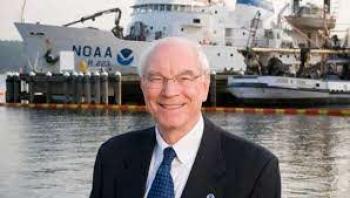Eddie Bernard

NOAA Heritage Oral History Project
NOAA Heritage Oral History Project aims to document the history and legacy of NOAA through compelling interviews with its leaders. These firsthand accounts provide an invaluable resource that preserves NOAA's significant contributions to environmental research and management, fostering a deeper understanding of NOAA's vital role in shaping our understanding of the Earth's oceans and atmosphere.
Eddie Bernard, born in 1946 in Houston, Texas, is a renowned tsunami expert with a significant career at the National Oceanic and Atmospheric Administration (NOAA). Raised in Beaumont, Texas, Bernard's family history traces back to their migration from Canada to Louisiana. His early interest in science and natural disasters, particularly tsunamis, propelled him towards a career in oceanography. Influenced by his high school teachers, Bernard pursued higher education at Lamar University, where he cultivated his passion for oceanography and met his future wife. His career trajectory was shaped by his decision to join the NOAA Corps as an alternative to the draft during the Vietnam War. Bernard's work took him to various locations, including Lake Ontario and Hawaii, where he conducted oceanographic research and water column chemistry. His tenure at NOAA saw him rise to the position of lab director at the Pacific Marine Environmental Laboratory (PMEL) and play a pivotal role in the development of the Deep-ocean Assessment and Reporting of Tsunamis (DART) program. Bernard's contributions to tsunami detection and preparedness have been recognized with prestigious awards, including the Presidential Rank Awards and the Hamaguchi Award for Enhancement of Tsunami Resilience.
Scope and Content Note
The interview with Eddie Bernard encompasses a comprehensive overview of his career and personal life, with a focus on his expertise in tsunamis. Bernard recounts his upbringing and the influence of his family's history on his career choice. He details his academic journey, his marriage, and the challenges of balancing a demanding career with family life. The interview sheds light on Bernard's significant contributions to the field of oceanography, particularly his role in the development of the DART program and his leadership at PMEL. He discusses the challenges of scientific research, including funding and infrastructure, and the importance of international collaboration in the development of the tsunami warning system. Bernard reflects on the impact of major tsunami events, such as the 1964 Alaska earthquake and tsunami and the 2004 Indian Ocean tsunami, on public awareness and the evolution of tsunami preparedness. Personal anecdotes about his service in the NOAA Corps, interactions with mentors, and non-tsunami related projects, such as studying underwater volcanoes, provide a holistic view of his professional life. The interview also touches on the successful implementation of the Tsunami Warning and Education Act of 2006 and the deployment of DART buoys.
Please Note: The oral histories in this collection are protected by copyright and have been created for educational, research and personal use as described by the Fair Use Doctrine in the U.S. Copyright law. Please reach out Voices@noaa.gov to let us know how these interviews are being used in your research, project, exhibit, etc. The Voices staff can help provide other useful resources related to your inquiry.
The NOAA mission is to understand and predict changes in climate, weather, oceans, and coasts, to share that knowledge and information with others, and to conserve and manage coastal and marine ecosystems and resources. The Voices Oral History Archives offers public access to a wide range of accounts, including historical materials that are products of their particular times, and may contain offensive language or negative stereotypes.
Voices Oral History Archives does not verify the accuracy of materials submitted to us. The opinions expressed in the interviews are those of the interviewee only. The interviews here have been made available to the public only after the interviewer has confirmed that they have obtained consent.
